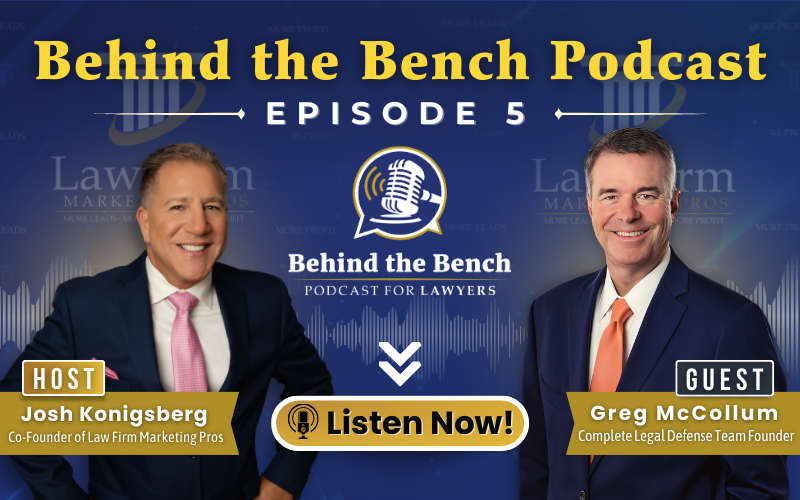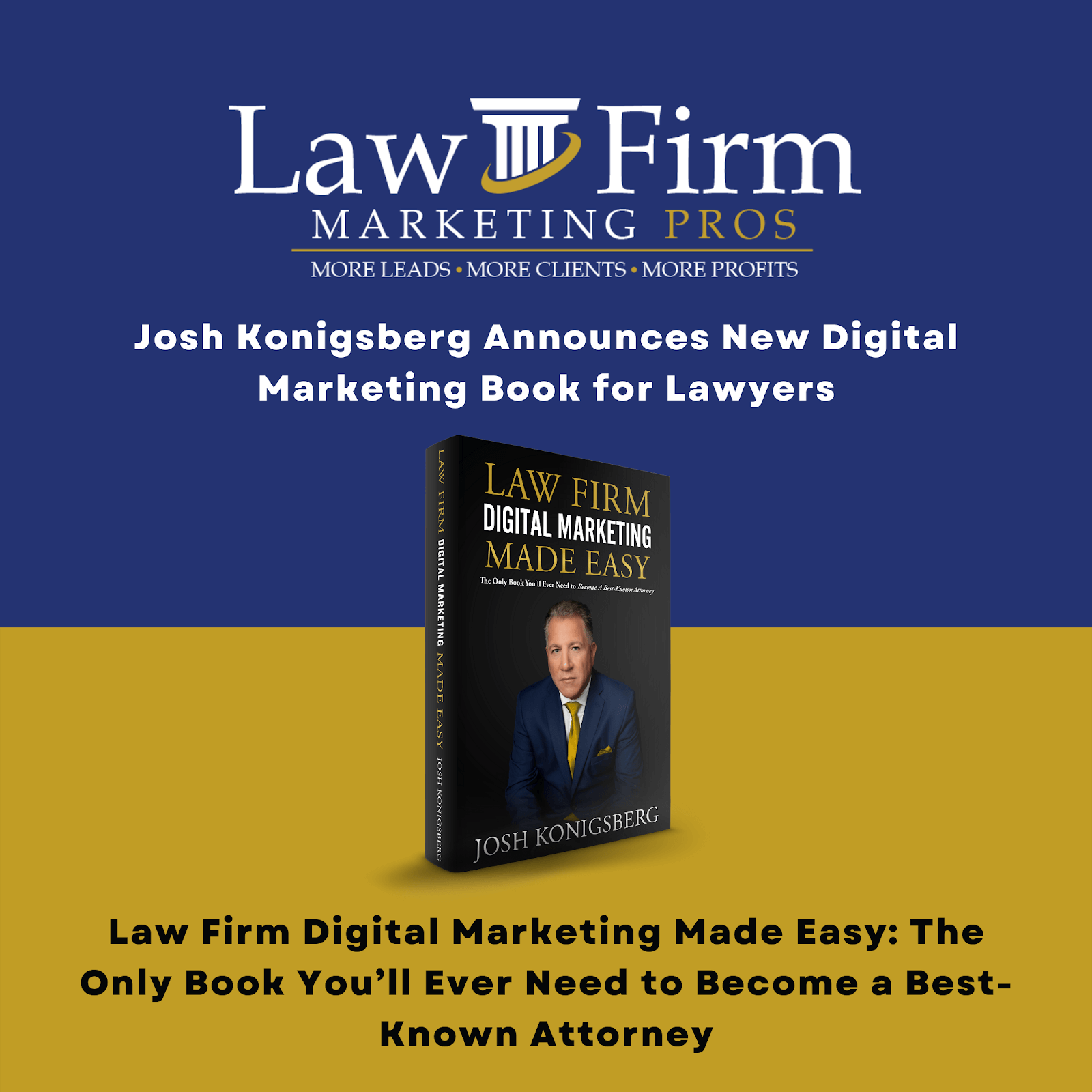JUPITER, Florida—Josh Konigsberg, Partner & Co-Founder of Law Firm Marketing Pros, an award-winning digital marketing agency offering the most cutting-edge, efficient, and cost-effective digital marketing tools available for law firms, recently welcomed Greg McCollum, Senior Felony Attorney and Founder of Complete Legal Defense Team in Myrtle Beach, South Carolina.
McCollum, who has practiced criminal law for over 30 years, explains that his firm defends the accused, who have a lot to lose. “Most of our clients have never been arrested before,” he says. “I was formerly a prosecutor, a DUI prosecutor, and then a private practice lawyer. Now I’m the owner of a criminal defense firm.”
“You’ve not only transitioned the practice to be a seven-figure practice; you’re helping other law firm owners struggling to grow with a coaching program called Prosper at Law. Can you tell us what inspired you?” Konigsberg asks.

“Prosper at Law was an idea I had to do active coaching and masterminds and to focus on criminal defense. I was talking to my friend Brana Williams about this. She has a very similar practice to mine. She owns a law firm, Indigo Family Law, in the Myrtle Beach area. We decided to work together to focus our coaching on criminal defense and family court lawyers, an underserved part of the market.
“I’ve done a lot of coaching with other coaches. In the personal injury area, there are a lot of resources, and a lot of successful people you can learn from. I don’t see that in criminal defense, and I don’t see it with family law. So Brana and I think that’s an underserved market and something we both know about. We can help people improve their lives, grow their law firms, turn their hectic solo law practice into a business that serves them, and give them a better life, more income, more free time, and make their life better overall.”
“You’ve identified an opportunity gap in the market within the niche of criminal defense and family law that needs to be served. You had mentioned to me in previous conversations about the size of law firms and the percent of the market that doesn’t even achieve $500,000 a year in fee income for the practice. Can you talk about that?”
“I was referring to some ABA studies, the American Bar Association,” says McCollum. “There are 1.3 million lawyers in the United States, and of those, something like 66 percent of solos earn less than $200,000 income, and I’m assuming it’s gross income. Another half of those are under $100,000. You have a situation where people got the education, the degree, and went through all the stringent requirements to be a lawyer. And now they have a hectic, stressful life, where they’re also broke. Anybody who has a law degree who’s ethical and goes to work should be able to figure out or learn how to make that work for them so they have more free time, a higher income, and more peace of mind.”
“Sounds like an altruistic approach to helping. Tell us a little bit about the model for Prosper at Law.”
“Prosper at Law is a startup. We’re in the process right now of launching our initial, live quarterly leap meeting. I was in a coaching program and we met four times a year, over the weekend, for two days. It was so experiential it helped me change my practice, helped me change my life. One of our main focuses or our model is (having) those quarterly meetings. We call them live quarterly leaps, where you’re immersed with other lawyers, learning things you need to know. You start making rapid progress, and you’re able to leap forward and take your law firm to a higher level. Over the course of a year-and-a-half to three years, probably double your law firm and maybe double it again.
“In my coaching program, some people were growing at 100 percent a year. Some people were growing 10 percent a year. It depends on the circumstance, but also the person—how much the person buys in, gets to work, and does the things that need to be done.”
“What is your what’s your differentiator? What’s your USP (unique selling proposition)?”
“The differentiator is that it’s an immersive program, focusing on those two small practice areas,” McCollum explains. “We’re not everything to everybody. This has been a 10-year journey. I started transitioning and transforming my law practice into a law firm in 2013. I know where the roadblocks are and where the bumps are in the road. I also know how to get somebody through that and help them believe in themselves and believe it’s possible. That’s why the live meetings are so valuable because you get in a room with a bunch of people. And they’re living proof that it can be done because they’re just like you and me, and they’re doing it, and they know how to do it.

“In the world and other businesses, the legal field is not business-oriented. It’s a profession. And people go into it thinking that somehow the world is just going to take care of them. And what I see and what I’ve experienced in my own life is that’s just not true.”
“What are the key challenges for solo practitioners and small law firm owners in the industry, specific to family law and criminal defense law?” Konigsberg asks.
“It’s time management failure to get help. To have either vendors or employees that take tasks off the lawyer. The other thing is being relevant. When I first started practicing, there was this idea that it was a profession and you could—if you’re honorable and do a good job—it was this old saying that if you take care of the law for 10 years, the law will take care of you the rest of your life. That’s gone away. The way people find legal services where they look, and who they ask that’s completely changed.
“Most lawyers who have been practicing 20 to 30 years are looking for any way to get out of it because it’s taxing. Time management, people management, marketing, and sales, are the things that we would focus on.
“When you’re practicing by yourself, you’re a technician, you’re like a programmer, a bricklayer, a hair stylist. You want to make more money. You either bring in more clients or raise your prices. Most people don’t believe they can raise their prices. Then, when they bring in more clients, the workload increases. Now they’re working more and more hours, farther and farther behind, more and more stress, and more and more unhappy clients. You have to figure that out so that you have the revenue to support a business, and know what it takes to make a business run.”
“The problem I’ve seen after working with attorneys for 13 years is that you guys don’t spend any time in law school in business,” Konigsberg replies.
“Certainly, at the law school I went to, no one ever talked about business. It’s not even seen as a business, it’s seen as something else.”
“Could you share a memorable success story or challenge that you overcame?”
“The biggest obstacles I faced were cash crunches,” McCollum replies. “I remember coming back from my morning run the day before payroll went out, and we didn’t have it. We’re scrambling. They were trying to get something in the door calling prospective clients back, trying to give somebody some kind of deal if you hire us now. And that happened many, many times, this situation where you’re just desperate to bring in money. And that’s part of the growth curve. If someone can borrow the money to invest in themselves, that’s good.
“I wasn’t credit-worthy, because I had a very large real estate portfolio that went down in 2007. I wasn’t in a situation where I could even get a credit line. Prior to that, I could write a check for $100,000 or $200,000. But all that went away. I went through several bookkeepers trying to find a good bookkeeper. Every bookkeeper I hired, the first thing they told me was, ‘You need to stop all this coaching. You don’t have the money for this coaching; you need to cut this out of the budget.’ That’s the biggest thing I overcame.
“When I started coaching, my revenue shot up probably 40 percent. Now I was spending money. I wasn’t rich, I needed that money. The most important thing is learning that I could do it. I went from knowing I couldn’t do it to believing that maybe I could. That was the greatest transformation.”

“Against the advice of multiple bookkeepers over time, you continue to invest in your business and yourself to get it to the next level. How long do you think that transition took?”
“It’s hard to answer that because what’s the next level? I was in real estate for a long time. At one point, I had almost 50 houses that were on the rental program. I’d watch the infomercial, where they’re saying, ‘Okay, you can be a millionaire in this period of time, and they show somebody in a private jet.’ When I became a millionaire the first time, there were no private jets because you had them in dollars in investments.”
“When did you get to that point?”
“I’d say probably never,” McCollum says. “Because there’s always growth, always challenges. Is there a part where you go, ‘Oh, I’ve got it. I don’t want to do anything else?’ For most people, I don’t think so. Life is an experience, not a destination. Growing a business is an experience, not a destination. There’s no magic rainbow with unicorns and gold where you just sit down and maybe you’re now content. Jordan Peterson asked someone, ‘What do you want to do?’ The person says, ‘I want to lay on a tropical island and drink margaritas.’ And he responds, ‘That’s not a goal. That’s a vacation.’
“Joy and happiness come through growth and achievement. Sometimes there’s hard work, sometimes there’s fun work. But I would not encourage somebody to join Prosper at Law because they think in two years they’re going to be sitting on the beach drinking margaritas and never have another problem. It’s just not reality. It’s a shift in mindset to understanding what the goals are, ultimately having freedom and options that financial success brings. That’s how I see it. Those options could include giving back to the community through various charitable organizations or however one wants to define it.”
“What are the most significant trends in the legal industry over the past year or two?” Konigsberg asks.
“Trends for me are much longer. The biggest trend is the internet, the search engines, because before somebody could find you, now you’re invisible. You have to pay to play. Ten or 15 years ago, there was no video. Now people watch videos all day of strangers. Video delivers so much in terms of you can see someone, you can hear them speak, get a sense of who they are and what they are, that you cannot get with words or even pictures. Also accepting the fact that we’re in this information age with social media, search engines, and you have to deal with it, you have to plan so that it’s serving you, versus you complaining about it.”
Watch the full interview below.
About Law Firm Marketing Pros
At Law Firm Marketing Pros, our vision is to help improve the way law firms market their services. Our mission is to educate, serve, and provide our clients with the most cutting-edge, efficient, and cost-effective online marketing tools available to increase their revenues and profits and exceed their goals.
Learn more about us on Facebook, LinkedIn, X, Instagram, and TikTok, and subscribe to our YouTube channel, Spotify, Amazon Music, Google Podcasts, and iHeart Radio Channels.
Please feel free to contact josh@lawfirmmarketingpros.com with any questions about Law Firm Marketing Pros.
Law Firm Marketing Pros
250 S. Central Blvd, Suite 100-A
Jupiter, FL 33458
(561) 948-5001
https://lawfirmmarketingpros.com/







